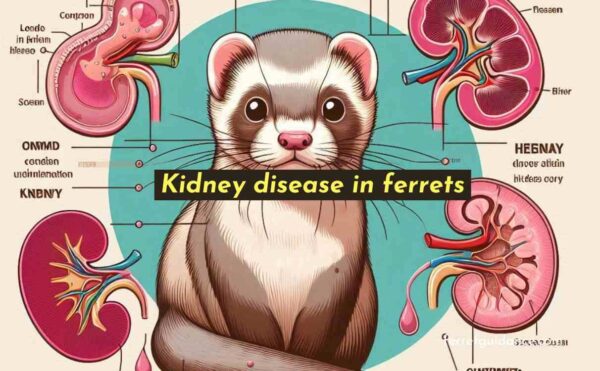Have you ever asked or thought of kidney disease in ferrets? I know it’s not a good thing to think of but, anything can happen, right?
Ferret kidney disease is a very serious illness in ferrets. Your awareness of this disease is a must thing so that it can be treated on time.
In this article, I will talk about the symptoms, causes, diagnosis, treatment, etc of kidney disease in ferrets.
So, make sure to read till the end.
Content List
What is kidney disease in ferrets?
When the function of the kidney gets disturbed due to one or more reasons then, it is called kidney disease in ferrets.
The extent of the disease depends on the intensity of ferret kidney infection. In some cases, it also becomes life-threatening to ferrets.

Some of the common effects of kidney disease in ferrets are problems in urinating, excess pain, decrease in ferret activeness, etc.
The shape of the ferret kidney is bean-shaped and it lies in the retroperitoneal spaces. Due to this geometry of the ferret kidney, it becomes hard for them to urinate easily.
The common symptoms of kidney disease are lethargy, increased thirst, lack of appetite, loss of weight, increase in urination (polyuria), dehydration, weakness, ulcers in the mouth, and depression.
In medical cases of stones and cysts, the ferret may have pain and problems in urinating.
Symptoms of ferret kidney disease
As a ferret owner, knowing the symptoms of kidney disease in a ferret is a great thing. It helps in faster treatment and recovery from this serious injury.
One more important thing that needs to be noticed is that symptoms can be examined in two ways. The first one is by observing ferrets and their activity.
For example, if your pet is behaving out of place and shows less energy then he is having kidney disease.
The second and most important one is to do by proper examination of your furry friend at a vet clinic.
If there are differences in shape and size of the ferret kidney or increased blood pressure, then your pet possesses kidney disease.
Dehydration and polyuria are the other two major symptoms of kidney disease in your ferret.
What Causes kidney disease in ferrets?
Knowing the cause of ferrets’ kidney disease is probably the most important thing you should do. Knowing this will help you take care of your ferret in a much better way and keep away from kidney disease.
In ferrets, many cystic lesions were placed into the secondary polycystic category. But, many of these were cases of membranous glomerulonephritis and they are the major cause of kidney disease in ferrets.
In some cases, the presence of Aleutian disease virus infection also affected the kidney of the ferret. In comparison, acute kidney injury in ferrets is seen due to intrinsic renal insults.
There are also other causes of kidney disease in ferrets which are mentioned below:
- Autoimmune disease
- Infection (Aleutian disease)
- Side effects from medication
- Kidney cysts
- Stones in the kidney, and urinary bladder
- Cancer or tumor
Diagnosis of ferret kidney disease
Diagnosis is the first and the most crucial step towards ferret kidney disease treatment.
It is done by a ferret veterinarian. It involves full ferret physical checkups and full medical history details.

The checkup consists of urine tests, a blood count, an ultrasound, an endoscopy, and a biopsy. With these tests, your vet will understand the current situation of the ferrets.
It will help a lot to treat ferrets in the right direction with the required care and medication. The physical examination can find the following undesired changes:
- Pallor
- Dehydration
- Irregularities in the size of the ferret kidney
- Increase in blood pressure
- Polydipsia
Treatment
The treatment of ferret kidney disease depends on various factors. The most important ones are the reason for the kidney disease, the age of the ferrets, and how old or highly it affects the ferret’s kidney.
The vet may prescribe some antibiotics or treat for the toxins if it is in the initial state. The types of medication depend upon the symptoms your ferret is exhibiting.
It’s important to note that ferrets need to be given a well-balanced diet, heat therapy, and proper fluids. It makes ferret kidney treatment easier and saves a lot of time.
In some cases, ferret kidney symptoms are acute and sudden, then in such cases, hospitalization of the ferret is required.
In such a case, your pet ferret is under observation 24 hours a day.
kidney failure in ferrets
Ferret kidney failure is the most sensible state of ferret disease. In such conditions, ferrets are often treated with fluid therapy to assist with depleted body fluid levels.
In the condition of kidney failure in ferrets, you can’t be ignorant otherwise you can lose the life of your furry friend.
Failure of kidneys in ferrets means failure of the blood pressure, blood sugar, blood volume, water composition, and pH levels.
This failure started producing certain hormones and red blood cells. By this time it become too late to treat your pet effectively.
Symptoms of kidney failure in ferrets
Broadly, there are two types of kidney failure in ferrets. The first one is acute renal failure, which occurs as a sudden onset syndrome.
The second one is chronic renal failure, which is caused due to a more long-standing disease.
Acute renal failure (ARF) symptoms
- Instant loss of appetite, tremors, seizures
- Depression, dehydration, poor hair coat
- Diarrhea, fever, vomiting, increased heart rate
Chronic renal failure (CRF) symptoms
- Excessive salivation, weight loss, diarrhea
- Abnormally large or small kidneys
- Lethargy, poor hair coat, seizure or coma
Ferret kidney failure causes
- Exposure to toxins
- Heart failure
- Shock
- Drug toxicity
- Kidney or bladder disease
Frequently Asked Questions (FAQs)
How long do ferrets live with kidney disease?
Depending on the intensity of the disease and treatment ferrets can live from a few months to years with kidney disease.
Is there a cure for adrenal disease in ferrets?
Yes, treatment and surgery are the ways to cure ferrets of adrenal disease.
What are the initial symptoms of ferret kidney disease?
Loss of appetite, dehydration, and low energy are the initial symptoms of ferret kidney disease.
Conclusion
Now, you have fully understood- kidney disease in ferrets.
Change in the size of the kidney, dehydration, and increased blood pressure are some common symptoms of ferret kidney disease.
The proper vet checkup, examination, and medication are the only ways to cure ferrets from kidney disease.
Your ignorance can cause kidney failure in ferrets which will put in danger the life of your ferret.
